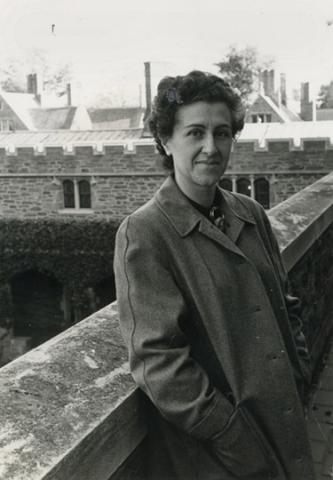Messages to a Mentor
Mawrters salute Bruni Ridgway.
Legendary Bryn Mawr professor and authority on Greek sculpture Brunilde Sismondo Ridgway, M.A. ’54, Ph.D. ’58, earned her Italian doctorate at the University of Messina. She began teaching at Bryn Mawr in 1957 and, in 1977, was named Rhys Carpenter Professor of Classical and Near Eastern Archaeology, a position she held until retiring in 1994. In 1988, she won the Gold Medal of the Archaeological Institute of America.
On the occasion of her 90th birthday, greetings poured in from around the world. Herewith a small selection of the messages.
Elizabeth Barber ’62, Professor of Linguistics and Archaeology, Occidental College: Bruni the thoughtful, Bruni the helpful—with that wonderful laugh! Long after I graduated, long after she had helped me and my classmates figure out how to study archaeological monuments..., her helping hand was still there.
Beth Severy-Hoven ’90, Professor of the Classical Mediterranean and Middle East, Macalester University: When I was working on my Ph.D.…Crawford Greenewalt asked me to identify some sculptural reliefs at my oral qualifying exams. My advisor shifted in his seat uncomfortably—I hadn’t taken any art history courses at Berkeley. When I started diagnosing the Archaic style and slender hands that looked to me south Italian, my advisor relaxed, but Greenie looked puzzled. “How do you know so much about Greek sculpture?” the third committee member asked. “I took three undergraduate courses from Bruni Ridgway,” replied I. “Oh, well, I shouldn’t have even bothered,” concluded Dr. Greenewalt.
Amy Bogaard ’94, Professor of Neolithic and Bronze Age Archaeology, St. Cross College, Oxford University: I vividly recall the thrill of your lectures, the richness of the information you imparted, and the sense you conveyed that there was so much exciting work yet to be done. ... I also remember a key piece of advice you gave me when I was graduating: that I shouldn’t forget to develop a life outside of the library and not forget to have children! Eventually I did succeed in having a child, now a daughter (Greta) of 10—but not until I had finished my Ph.D. and had a teaching job.
Tamar Hodos ’90, Reader in Mediterranean Archaeology, University of Bristol: The first archaeology lecture I ever attended was the initial session of your Introduction to Classical Archaeology 102 course. ... That class was like an epiphany for me, because you made the past real. Within that single session, you made me realise that the world of the ancient Greeks was not solely about deities, epic battles, tyrants, or dots on a map. It was about real people who made things and used things, and who lived, loved, and lost just like I did.
Tom Roby (HC ’79), Senior Project Specialist, The Getty Conservation Institute: Your teaching of Arch 101 convinced me to major in archaeology, and although I decided to pursue a career in archaeological conservation..., your inspired teaching has been a great influence in my life. Every time I have the opportunity to see or work on Greek or Roman sculpture, most recently the Ludovisi throne in Palazzo Altemps in Rome, I am reminded of you.
Nancy A. Winter, Ph.D. ’74, Senior Researcher, Ancient Mediterranean Studies, UC Santa Barbara: How often I think about the many ways in which studying with you changed the course of my life, directing me toward the American School of Classical Studies and my lifelong career there, but at the same time encouraging my love of Italy and its ancient cultures. My life would have been considerably more conventional if I had not met you!
Joanna Smith, M.A. ’89, Ph.D. ’94, Consulting Scholar, Penn Museum, and Consulting Curator, Ringling Museum of Art: I think of you often as I work on The John and Mable Ringling Museum of Art’s new ancient gallery. Many of the 200 pieces to be on display are sculptures from Cyprus. Yes, indeed, finally I am working on sculpture! And what fun I am having and how much I learn each day.
Read more greetings.
Published on: 02/07/2020
